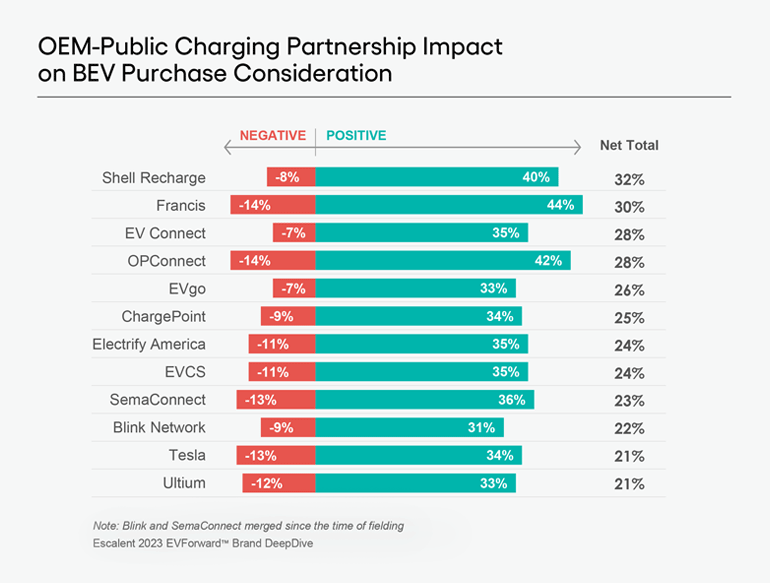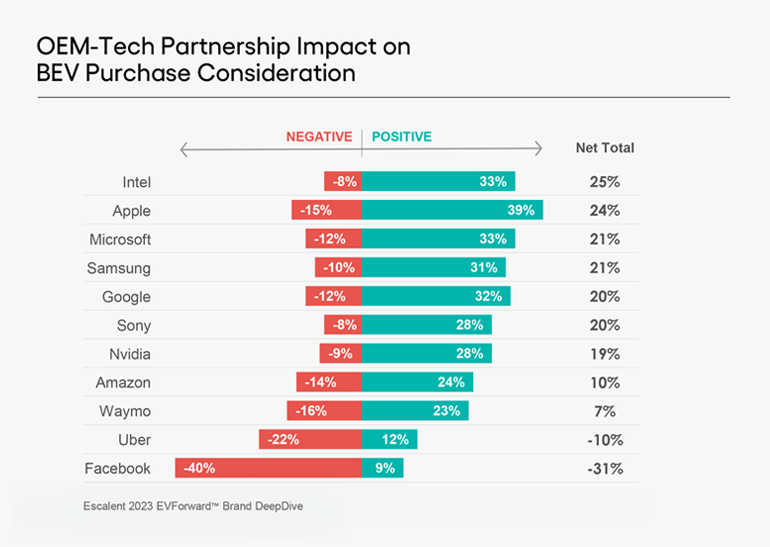
Consumers are increasingly familiar with battery electric vehicles (BEVs), and as more vehicle buyers turn their attention to electric models, brands are jockeying for market share. At the same time, original equipment manufacturer (OEM) brands are increasingly looking outside of traditional suppliers to help build a compelling BEV “ecosystem,” partnering with charge network operators and tech companies to fill capability gaps.
Since Escalent’s first EVForward™ Brand DeepDive study in 2021, the BEV industry has matured. Legacy automotive brands have solidified their electric vehicle (EV) lineups. Meanwhile, EV specialists such as Polestar and Lucid are no longer considered newcomers to the space.
The 2023 EVForward™ Brand DeepDive provides an updated look at the evolving BEV market. The study examines new-vehicle buyer attitudes toward 52 automotive, 12 public charging and 11 technology companies. In doing so, we explore how the next generation of EV buyers perceive automotive, charge network and technology brands—and how those perceptions interact to influence BEV purchase consideration.
Established Automakers Prevail—For Now
As electric powertrains become more prevalent, awareness of BEV brands and models is rising. For now, though, legacy automotive brands and Tesla still have the edge in consumer mindshare. Familiarity with established automakers such as Ford, Toyota, BMW and Mercedes-Benz is at almost 100%. Tesla is the only EV specialist brand to be in the same ballpark, at 98% familiarity, with other startup EV specialist brands scoring below 60% for brand familiarity.
That said, brand familiarity is only part of the picture. To successfully market their products, manufacturers need consumers to be conscious of their BEV-specific offerings. In this regard, EV specialists have an advantage. Tesla, Lucid, Rivian and NIO net the highest scores for recognition of BEV offerings.
Drivers consider quality and dependability to be among the most important vehicle attributes. As a result, legacy auto brands with proven track records trend toward the top of BEV purchase consideration lists. Tesla is the only EV specialist to make the top 10 for consideration and opinion ratings. However, as EV specialist brands solidify their position in the market, we can expect legacy auto brands to face elevated levels of competition.
A Shift in Consumer Sentiment Toward Tesla
Tesla has long enjoyed a significant mindshare among consumers, and that remains the case. Once an outsider, the brand has become a formidable rival for legacy and EV specialist brands. Tesla is neck and neck with legacy automakers for brand familiarity, and consumer consideration is high. This is especially true for EV Intenders—consumers who are most likely to purchase a BEV as their next car.
Despite this, consumers have mixed sentiments about the Tesla brand. Approximately one in four new vehicle-buyers feels the company is moving in a negative direction. The brand has received substantial media attention in recent years, and not always for the better. Consumer reactions suggest that this exposure could be hurting rather than helping Tesla’s image—positioning other automakers to muscle in on Tesla’s market share.
Power in Automaker and Charge Point Operator Partnerships
Access to charging remains a key concern for prospective BEV buyers. While national infrastructure is expanding, many drivers harbor concerns about how they will charge when they are away from home. Cross-industry partnerships between automakers and public charging providers could assuage some of these anxieties.
Our research has found that partnerships between public charging providers and OEMs positively impact BEV purchase consideration among new-car buyers. When new-vehicle buyers are told that the automaker they favor is teaming up with a charge point operator (CPO), their consideration of a BEV from that automaker rises. Among the top-five-performing CPOs, BEV consideration increases an average of 29%. This increase is even more marked among EV Intenders.

This points to a potential win for OEMs, which stand to boost sales by partnering with a CPO. It could also allow CPOs—which suffer from extremely limited brand awareness—to tap into the recognition that established automakers enjoy.
Technology Is a Differentiator
With technology serving as an important motivation for a BEV purchase, our findings suggest that partnering with a technology brand such as Intel, Apple or Microsoft could also positively influence BEV purchase consideration.

Car owners rate “innovative features and technology” as an important attribute in a BEV, ranking fourth most important among luxury car owners and seventh most important among mainstream car owners. By aligning themselves with a recognized technology company, OEMs could improve perceptions around their capacity for innovation. This could be particularly effective for legacy brands, which underperform in this area. OEMs such as Volvo and GM have already begun working with Google to provide infotainment and connectivity functions.
However, while strategic partnerships with technology brands could enable OEMs to attract new customers and augment core BEV attributes, automakers should proceed with caution. For the majority of technology brands tested, new vehicle-buyers indicate a net positive impact on BEV purchase consideration. Uber and Facebook, on the other hand, score net negatives. As such, brands considering who to partner with should pay close attention to consumer sentiment.
A Turning Point
It is a critical moment for BEV manufacturers. The shift to EVs is well underway, buoyed by commitments from OEMs to go all-electric in the coming years.
During this transitional period, legacy brands will need to work hard to maintain their standing in the industry. They may have the benefit of consumer trust and loyalty, but our data show that, when it comes to awareness of BEV offerings, EV specialists often outpace legacy automakers. As familiarity with BEV offerings grows, legacy brands will have to compete not just with Tesla but with a wide variety of EV specialists.
Automotive partnerships with CPOs and technology brands could drive affinity and consideration among new customers by improving perceptions around charging and in-vehicle technology. Today, legacy auto brands have a significant level of market share. To preserve that lead, they will need to go all-in on innovation.
Want to learn more? Let’s connect.
To learn more about our findings and how we can help you build your brand to stand out in the BEV marketplace, please contact us.









